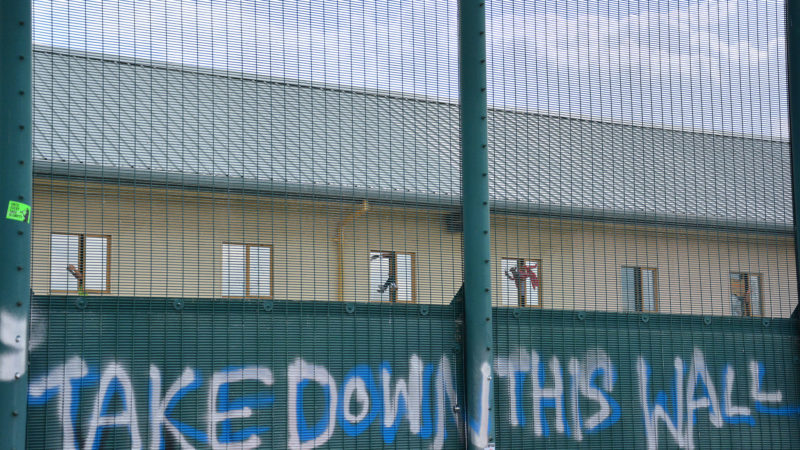Those in detention centres have committed no crime so why aren't they released?

“If there’s an outbreak in here we’ll be like sitting ducks. 80% or 90% of us will pick it up because we are all here together. If someone sneezes we’ll get it, the air is recycled, there are no windows or fresh air.”
This is the plea of a detainee in one of the ten Immigrant Removal Centres across the UK.
Despite releasing around 700 detainees, many vulnerable adults remain in detention and experts have warned that many could become infected.
You can see why they’re worred. In the last few weeks there have been reports of a lack of hand soap and sanitiser – leaving detainees with only shower gel to fight the virus – and rising anxieties of contagion.
Immigration Removal Centres, like prisons, are acutely overcrowded. Unlike prisons, their residents are not held under criminal conviction but are subjected to a blunt and cruel administrative process.
“The purpose of detention centres shall be to provide for the secure but humane accommodation of detained persons.”
This is the first line of the Detention Centre rules (2001). A singular statement that pulls into sharp focus serious questions about human rights violations in terms of the provision of “humane conditions”. Last year, the Home Office was forced to pay £8.2m to 312 people who were found to be unlawfully detained, illustrating how the government are able to bury the plight of those treated inhumanely in our society.
So far, there have been two recorded cases of Covid-19 and reports of numerous residents in three different centres suffering from symptoms. Yet detainees find it near impossible to self-isolate. They eat side by side, and share the same recreational facilities and outdoor space. All enforcing close contact, with officers moving freely from wing-to-wing.
Due to staff shortages since the pandemic began, detainees have taken on additional service roles. One man in Brook House was taken ill days after serving food to the other detainees. The sick have been told to ‘cohort’ but with no additional PPE or testing.
A lack of public health information and clear care pathways to medical attention means that those with common colds are at risk of mixing with those showing genuine symptoms. Diagnosis remains unconfirmed unless detainees are eventually hospitalised, as there is no access to onsite testing and are so there is likely widespread underreporting. In such unsanitary living conditions, this poses a serious threat to their safety.
A similar situation is now being seen as a crisis in our social care sector. The latest statistics estimate just under 11,000 more people than normal have died in residential care. Like in removal centres, there is a chronic underreporting of fatalities and a lack of preventative procedures in place. We cannot allow a similar “unimaginable human tragedy” to unfold in removal centres.
“Psychologically, almost everyone leaves worse than when they came in”
This is the statement of one medic, Dr Mary Karama. Those detainees who are “at risk” have been asked to go into solitary confinement with no clear access to fresh air or exercise, a measure usually reserved for the punishment of dangerous criminals, not the asylum seekers which make up 50% of removal centre residents. These conditions pose serious risks to mental wellbeing. Residents are known to suffer from anxiety (34%), post-traumatic stress (23%), depression and bipolar (36%). With these issues now heightened, they are without recourse to chaplaincy and therapeutic services.
“Imprisonment should be a measure of last resort”
Removal centres are not human warehouses; a sentiment emphasised by the UN Rights Chief last month, which advised Governments should release every person detained without sufficient legal basis. Holding immigrants with no prospect of return is a clear breach of international human rights law according to the Dublin Agreement, which states the purpose of Dublin returns can only be lawful as long as it is feasible that return can indeed take place. With the world in lockdown, it seems ludicrous to believe these people will be travelling anywhere. The Home Office has halted the new detentions of persons destined for certain countries. But what of the rights of those still currently detained?
“The safety of detainees and staff is of vital importance”
As a result of the High Court case, the Home Office vowed to take sensible, precautionary measures. But this was nearly three weeks ago.
Alongside organisations such as Bail for Immigration Detainees and Detention Action, we are calling on the government to stop all new detainments, to release all detainees, and to provide a full update on whether the healthcare provision promises made on March 25th have been implemented for those left in detainment.
We urge the Government to make provisions for those released, including safe housing arrangements whether that be with family, friends or Government provided accommodation. There must be clear pathways to public health services and information in languages they can fully comprehend. This is all the more critical now as many informal networks typically relied upon by migrant communities are forced to cease operations.
We cannot allow over 700 people to be left without basic human rights in the midst of a global pandemic. Many of whom are already very vulnerable, fleeing war, violence and extreme poverty. On the other side of this crisis, sacrificing the lives of those under our duty of care will have long term consequences.
Olivia Williams is from the Labour Campaign for Human Rights
Left Foot Forward doesn't have the backing of big business or billionaires. We rely on the kind and generous support of ordinary people like you.
You can support hard-hitting journalism that holds the right to account, provides a forum for debate among progressives, and covers the stories the rest of the media ignore. Donate today.



